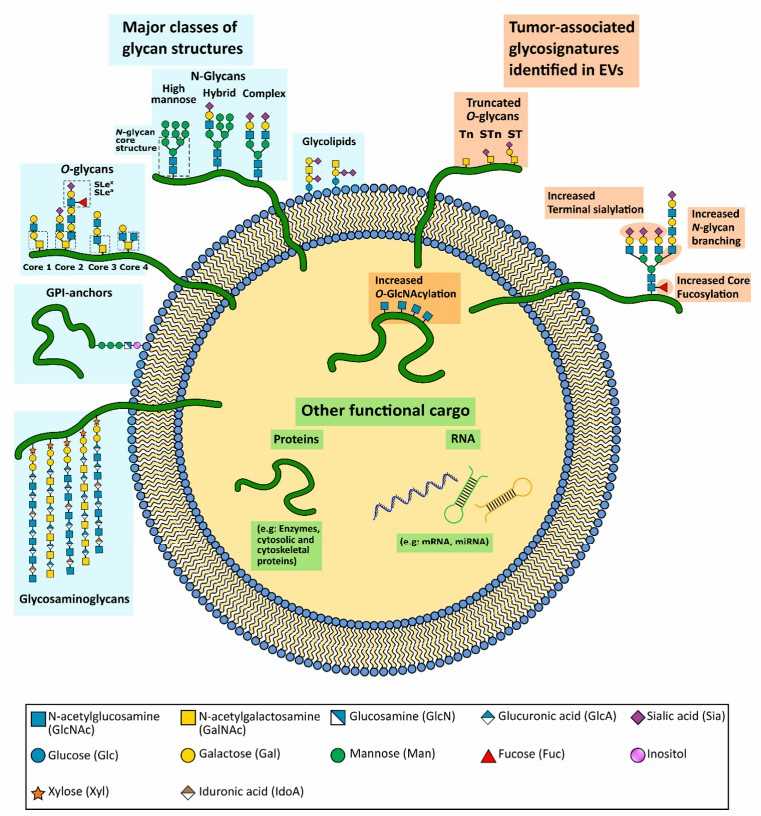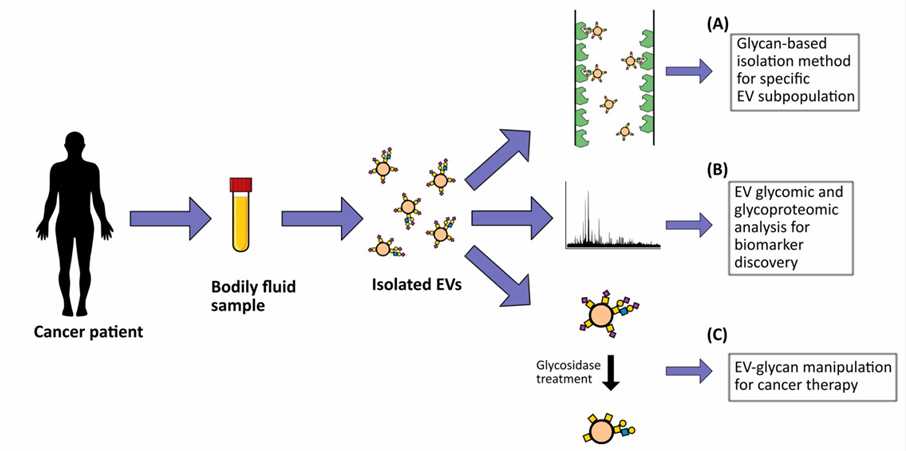Glycosylated Exosome Detection Services
Overview Services Features FAQs
Creative Biolabs provides glycosylated exosome detection services to assist clients in the identification and profiling of the exosome glycosylation proteome.
Introduction to Glycosylated Exosome Proteomics
-
Glycosyltransferases are responsible for the transfer of glycans to proteins. These enzymes also shear and process glycans to generate different types of glycan chains and make glycosidic connections with amino acid residues on proteins.
-
As the exosomes are covered with glycoproteins, exosomal protein glycosylation plays an influential role in regulating transmembrane signaling, functional and physiological patterns between exosomes and receptor cells, and tumor progression and metastasis. The study of exosome glycosylation contributes to the understanding of the physiological functions in which exosomes are involved and to the development of disease-related diagnostic and therapeutic markers.
-
The key task of glycosylated exosomal proteomics is based on the global search for sites where exosomal proteins undergo glycosylation modifications, the resolution of glycan structures, the identification of intact glycopeptides, and the exploration of the roles and biological functions of exosomal glycoproteins in biological activities.
 Fig.1 Glycoproteins and glycolipids are found in exosomes.1
Fig.1 Glycoproteins and glycolipids are found in exosomes.1
Glycosylated Exosome Detection Services at Creative Biolabs
Creative Biolabs is equipped with two powerful detection platforms, mass spectrometry and antibody microarrays, to select the superior technology for the detection of the glycosylated exosome proteome for different research needs. Mass spectrometry has a significant advantage in identifying new proteins (especially membrane proteins) that can be carried in exosomes, while antibody microarrays are more sensitive and accurate in identifying secretory proteins carried in exosomes (antibody microarrays can currently detect over 500 secretory proteins), based on the specificity of the antigen-antibody response. Our glycosylated exosome detection services include:
Glycosylated Exosome Detection Features
-
Cutting-edge technologies such as mass spectrometry and flow cytometry are utilized for highly sensitive and accurate detection of glycosylated exosomes.
-
Comprehensive analysis of glycosylated exosomes allows for the identification of specific glycan structures and their potential biological functions.
-
Our services include sample preparation, data analysis, and interpretation to provide a complete solution for glycosylated exosome detection.
-
The flexibility to analyze both small-scale and large-scale sample sets enables researchers to study glycosylated exosomes in different experimental contexts.
 Fig.2 Potential clinical applications of EV glycosylation.1
Fig.2 Potential clinical applications of EV glycosylation.1
FAQs
Q: What is the significance of detecting glycosylated exosomes?
A: Glycosylated exosomes play a crucial role in cell-to-cell communication and have implications for various physiological and pathological processes. Detecting glycosylated exosomes can provide valuable insights into disease progression and biomarker discovery.
Q: What is the rationale for detecting glycosylated exosomes?
A: The basic principle of detecting glycosylated extracellular vesicles is to use specific antibodies or lectins that can bind to the sugars present on the surface of the vesicles. By labeling these antibodies or lectins with a fluorophore or other detection molecule, researchers can visualize and quantify the glycosylated vesicles using techniques such as flow cytometry, immunofluorescence, or electron microscopy. Additionally, glycosylation-specific enzymes or inhibitors can be used to confirm the presence of glycosylated vesicles in a sample.
Creative Biolabs provides comprehensive glycosylated exosome detection services through glycosylated proteomic mass spectrometry and high-throughput lectin microarrays, enabling not only differential screening of glycoprotein profiles in high-volume exosome samples to identify candidate markers, but also glycosylated proteomic mass spectrometry resolution of specific lectin-identified glycoproteins to obtain a complete glycan structure and glycosylation site map. Please contact us with your interest.
Reference
-
Martins, Álvaro M., et al. "Glycosylation of cancer extracellular vesicles: capture strategies, functional roles and potential clinical applications." Cells 10.1 (2021): 109. Under Open Access license CC BY 4.0. The image was modified by revising the title.
For Research Use Only. Cannot be used by patients.
Related Services:

 Fig.1 Glycoproteins and glycolipids are found in exosomes.1
Fig.1 Glycoproteins and glycolipids are found in exosomes.1
 Fig.2 Potential clinical applications of EV glycosylation.1
Fig.2 Potential clinical applications of EV glycosylation.1









